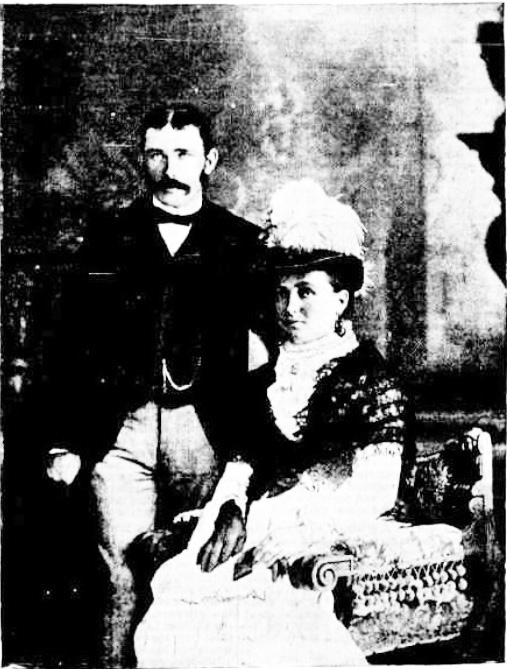Black Widow
The true story of Australia's
first female serial killer
Louisa Collins
by Carol Baxter

Historical importance
1888 was an eventful year in the criminal calendar:
- the centenary of British settlement in Australia (a colony of crooks);
- the year "Jack the Ripper" launched himself onto the world stage;
- the year Australia discovered its own "Lucretia Borgia": Louisa Collins.
Louisa would become the last woman hanged in New South Wales. Her case was controversial and unforgettable, a foretaste, in many ways, of what would later transpire in an equally celebrated Australian criminal case, that of Lindy Chamberlain ("a dingo took my baby").
Carol Baxter's journey to writing Black Widow
Carol had long been interested in Louisa Collins' story. Did she kill her two husbands (and possibly a baby)? The literature was uncertain. So Carol wondered if she could use her research skills to determine the truth.
When she stumbled across a reference to Louisa as "the Lucretia Borgia of Botany", she realised that the necessary big-picture themes would be reflected in the title "The Lucretia Borgia of Botany Bay". However, the marketing gurus changed the title to the shorter and more evocative, Black Widow, with the subtitle, The true story of Australia's first female serial killer.
Why "serial killer"? Some definitions state that a serial killer was responsible for three or more murders, others two or more. In view of the information Carol found, she and her publishers deemed that the term "serial killer" was appropriate.
Black Widow
The true story of Australia's first female serial killer
by Carol Baxter
Never before in the hundred year history of Australia has a female prisoner become so notorious as Louisa Collins. (Evening News, Sydney)
Two inquests, four trials, three hung juries and the executioner ... but was Louisa Collins really a husband killer? Was she the callous adulterous, drunkard and liar known as the Botany Bay Murderess and the Lucretia Borgia of Botany Bay? Or was this mother of seven a spirited and defiant woman who was punished for breaching society’s expectations of womanly behaviour?
Compelling, freshly told and richly detailed, Black Widow uncovers the truth of a story that challenged the morality, the politics and the notion of law in an Australia on the edge of nationhood.

Allen & Unwin, 2015
Trade paperback
Australian purchases
(mass paperback)
RRP: $30.00
Website price:
$27.50
International & Kindle

Michael Peter Collins
and Louisa Collins, 1887
Black Widow has been turned into a computer game.
Book Reviews
-
[Baxter] tells a good story ... [and] offers a perceptive and emotionally plausible account of why Louisa decided to poison Michael Peter Collins.
The Australian, Australia*
-
BLACK WIDOW is a fascinating book to read, it's beautifully constructed, making history come alive, allowing the reader to draw their own conclusions on many of the aspects of the story of Louisa Collins.
Australian Crime Fiction - full review
-
Carol Baxter is, however, alive to the gender politics of the case, particularly the depiction of Collins in the press as a Lucrezia Borgia ... She offers her own more nuanced interpretation that convincingly accounts for the unanswered question of why Collins killed her second husband.*
Sydney Morning Herald, Australia -
The book is very readable and cleverly structured so that any reader unfamiliar with the case is left in suspense almost to the end ... It's not exactly a cheerful tale but it is undeniably and interesting one, and Carol Baxter tells it well.
Online review by Stephen Dedman [www.tarasharp.com.au] - full review
-
Carol Baxter ... has dug deeper into the archives to arrive at a new, intriguing theory that portrays Collins as something of a sexy cougar desperate to control her much younger second husband ... Baxter's colloquial tone makes the book a compelling mix of domestic drama and detective work ... It also gives insight into the thinking and politics of colonial times.
Herald Sun, Melbourne, Australia*
-
Sydney, July 1888. A distressed woman begs a doctor to visit her violently ill husband whom she fears is close to death. The doctor, alarmed at the man’s deteriorating condition and the ineffectiveness of his prescribed treatment, discusses the case with a colleague and learns that the woman’s first husband died in suspiciously similar circumstances. The subsequent death of husband number two triggers a chain of events of which no-one involved could be proud. The little-known story of Louisa Collins, the so-called Botany Bay Murderess, makes for fascinating, albeit disturbing, reading. Convicted only after being prosecuted through three hung jury trials and a decisive (but legally questionable) fourth trial, Louisa was ultimately sentenced to death—the last woman to meet this fate in New South Wales. Author Carol Baxter tells Louisa’s story with eloquence and dispassion. Without advocating Louisa’s innocence, Baxter probes the facts of the case and questions the Crown’s relentless pursuit of her conviction and their determination to bring her to the gallows. By situating the case within its historical context, Baxter canvasses the various political and social debates it inflamed, such as the role of capital punishment, the case for gender equality and society’s expectations of women—issues that remain relevant more than a century later. Black Widow is an intelligent, extremely well-researched and thought-provoking examination of a grim episode in Australia’s colonial history.
Good Reading magazine*
-
Black Widow reads like a crime novel, something with which I am not unfamiliar. Indeed, as a “history detective”, Baxter is known for telling stories of seemingly ordinary individuals as true-crime thrillers. Her four other non-fiction books were published to critical claim, and it seems fair to suggest that many historical figures and events in Australia only became known to common readers as a result of her representation.
Voices under the Sun - full review
-
Wow what a read!
LoneTester - full review
-
*Reviews not found online or are sitting behind a paywall
Award shortlist
-
Black Widow was shortlisted for the Davitt Award (best crime books by female writers).